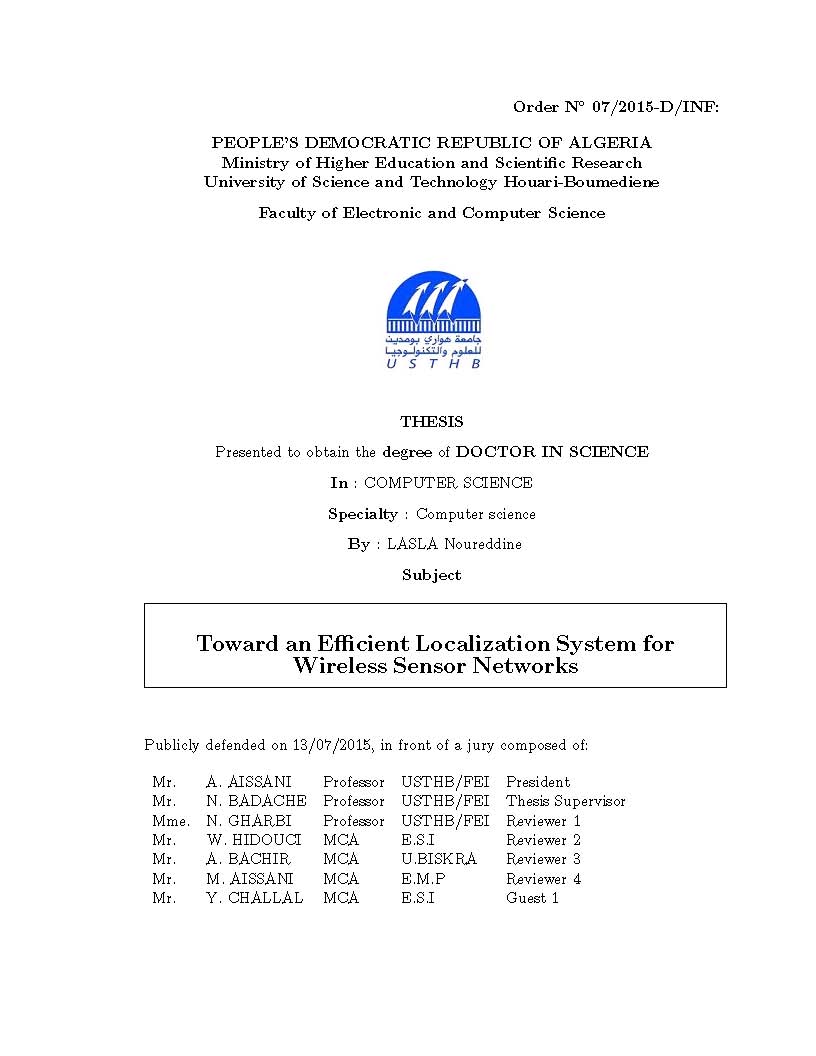Toward an Efficient Localization System for Wireless Sensor Networks
Thèses / mémoires Ecrit par: Lasla, Noureddine ; Badache, Noureddine ; Publié en: 2015
Résumé: Localization or geo-location is a fundamental service required by many wireless sensor networks (WSN) applications. In fact, for the sensed data to be considered, they need to be correlated to where they are collected from. In addition, for some network services such as geographic routing or coverage and for some network maintenance requirements, it is important for the location of the individual sensors to be known. Therefore, multiple work has been performed in order to provide the location information of individual sensors, and are broadly classiffed into range-based and range-free solutions. The range-based schemes work by measuring an accurate point-to-point distance or angle between two communicating nodes and generally require an additional ranging hardware to be embedded into each sensor node. The range-free solutions, however, are cost effective as they only use the proximity or connectivity information inferred from the radio communication. Although the range-based approach is supposed to be more encient in terms of accuracy, the limited computation, the constrained cost and the weak signal propagation quality in WSN, make it less eective and less appreciated. Therefore, we focused in the thesis on the range-free approach, especially on a technique based on the calculation of residence areas called area-based. This technique is deemed effective in applications where knowing the exact position of the sensor nodes is not a must. After motivating and arguing the choice of this technique, our goal is to improve its localization effciency. The existing area-based solutions suffer from, either, a lack of effciency or high cost engendered by the number of reference nodes (nodes with positions are known in advance) required for the calculation of the residence areas, or both. In ourffrst contribution, we tried to propose a new localization algorithm that introduces a new way to determine the residence area of each sensor node, using a relatively small number of reference nodes, and based only on simple comparisons of signal strength. In order to demonstrate the performance of our solution, we evaluated our system based on a mathematical analysis, simulations and experiments on a real sensor network. The results of the three analysis have shown the e ectiveness and the superiority of our algorithm over existing schemes. In this thesis, we also conducted a theoretical study on the placement of reference nodes for area-based approach. Since sensors' residence areas are determined based on the positions and the number of reference nodes, so it is important to reduce their count while preserving an acceptable location accuracy. In this study, we determined the optimal placement model for maximum accuracy while minimizing the number of reference nodes. We plan to extend this study, in our future work, in order to take into account other area-based approaches. The last contribution was devoted to the implementation of our localization algorithm for solving a well-known problem in wireless sensor networks which is the coverage problem. This problem consists in engaging only necessary nodes ensuring complete coverage of the monitored area, while switching the other nodes into sleep mode in order to save their energies, and extended the overall network lifetime. As the coverage is based on the knowledge of the location of each individual sensor, and because this information is often imprecise, the full coverage can not be guaranteed. For this, we use our algorithm which allows to provide accurate information about the maximum error bound, to propose a new distributed coverage algorithm ensuring complete coverage even in the presence of inaccurate location estimate.
alger:
Langue:
Anglais
Collation:
113 p. ill.
;30 cm
Diplôme:
Doctorat
Etablissement de soutenance:
Alger, Université des Sciences et de la Technologie Houari Boumediene
Note: bibliogr.104-113

